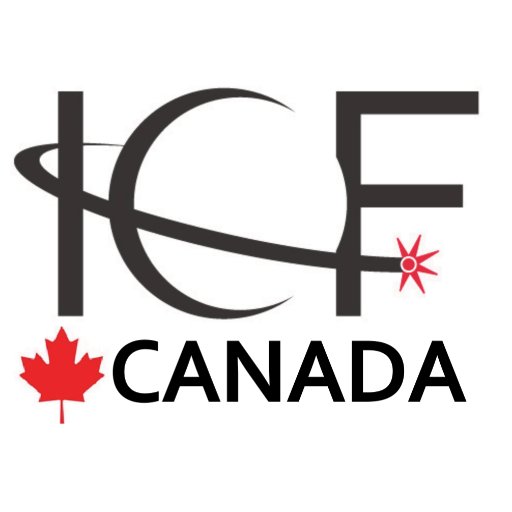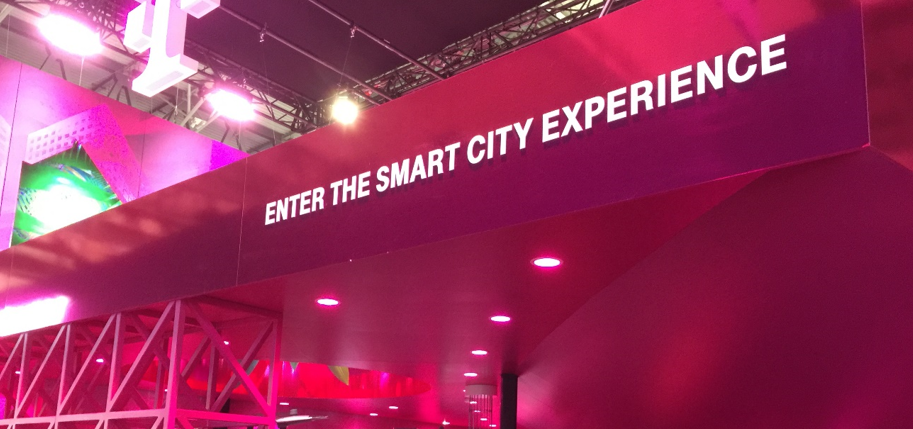
Blog: Smart Cities- a Dominant Feature of Barcelona’s 2018 Mobile World Congress
Mobile World Congress (MWC) 2018 in Barcelona is always a big show. With well over 100,000 attendees, mostly visitors from out of town, this show fills the hotels and restaurants of the city and adds significantly to Barcelona’s tax coffers. Yet, the streets were not filled as last year, but that may have had something to do with the unusual weather this year. Cold, blistering weather. For some, from tropical locations, this was their first experience with snow. Yes, snow in Barcelona! In fact, after registering over 500 to hear my talk on Intelligent Community Barcelona at the IESE Business School on February 27, it was cancelled due to snow.
The schools were closed and trucks forbidden to drive on the highways. Mass hysteria took over as soon as the flakes came slowly falling from the sky. “We just don’t know how to handle snow. We are not prepared for this. Better to cancel everything.” Coming from a snow belt region, the few flakes seemed to be a folly in the land of sun and oranges. A few flakes landed on my suit jacket. Salespeople came running out of their shops to take pictures of the snowflakes in the air, but no snow actually made it to the ground. There was little evidence of the snow in the city, but just outside the city, the snow blanketed the ground as it did most of Europe that week. Images of snowmen in Vatican Square and people throwing snowballs at each other in European streets were the headline news that week. Ah, but the restaurants were packed. Better to buy one more round of beers than to venture out into the cold.
Inside the Mobile World Congress, the attendees would soon forget the cold outside. There seemed to be several levels of delegates. First were those VIPs privileged with special access to enter vast rooms with walls and ceilings around them, shielding passing delegates to the secrets of the tech world beyond. Then there were the conference attendees; and then the rest of the throng not blessed with any kind of special access. Yes, but there was so much for them to see and do in these massive halls that it did not matter. The omni-present and ultra large flat screen video displays, reminiscent of a Blade Runner movie or images of Big Brother from 1984 played back the most recent conference speaker, interviews with company CEOs and announcements to witness the first showing of the newest smartphones or the latest virtual reality concoctions.
I frankly didn’t know what I should expect this year, but Déjà-vu it wasn’t. The place was laid out the same and it seemed that many of the same companies were in the exact same locations they were in last year, but something was a bit different. This year in addition to the massive signs proclaiming 5G everywhere and tutorials explaining the difference between 4G and 5G with its promises of higher and more robust speeds, lower latency and lower costs, there was also a greater proliferation of signage related to SMART CITIES. Conferring with a vendor to explain their smart city concept, it typically covered the ability of their product to be part of the efficiency and cost-effectiveness value chain. But the Europeans do it so well and mix in a bit of schmaltz:
“Hello, can I offer you an Espresso? By the way, while commercialization of 5G is not expected to start before 2020, our company is pushing other companies and governments to standardize norms for a smooth transition to 5G use worldwide. Is that with or without sugar?”
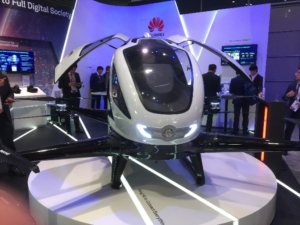
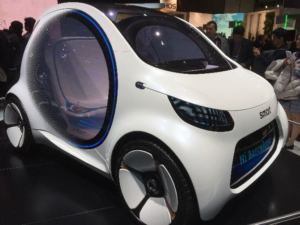
There were far more 5G automated cars on display as well as far more virtual reality and holographic experiences to participate in, yet the fifth-generation mobile networks seemed to hold sway from a technical perspective everywhere, especially with any Internet of Things (IoT) promoter and autonomous driving advocates. “Sir, 5G is expected to enable lightning-quick downloads 1000 times faster than today’s 4G capabilities and help guide driverless cars by instantaneous multiple connections within a city’s traffic ecosystem. Care to sit in the car and view the experience over our VR headset? Imagine what it will be able to do when we apply artificial intelligence to it.”
There were also many more drones, especially a full-fledged passenger drone on display in the Huawei booth with accompanying video that made the Wright Brothers first flight look ever so much more interesting. Nevertheless, it claimed that it was the first manned passenger flight in a drone, so it must have been important. There were other vendors promoting the perfect marriage between data and the cloud; retail solutions over IoT; big data solving healthcare challenges; and don’t forget the coming blockchain revolution!
There seemed to be far fewer wearables on display such Fitbit and Sony watches but there were always massive displays for the latest and greatest smartphones. Improved cameras and augmented reality seemed to be the hot buttons in most booths. But everywhere I turned around, vendors seemed to be including their concepts of how their company’s services and products could potentially be part of the smart city value chain. For instance, T-Systems invited you on a journey through their smart city booth touching on every conceivable aspect of the technology enabled experience. Companies such as Bosch, Cisco and Chunghua Telecom all had some element of smart cities in their lexicon: way-finding and paying for parking using your smartphone or future automated car systems; LED street lighting developing a smart city mesh for WiFi access; smart street lighting poles acting as a security blanket for the community and hubs for accessing information or providing data on traffic flow, environmental situations and pedestrian safety monitoring. Robotics factored into smart cities by helping the elderly; helping pedestrians to find their way; or as working stiffs in automated manufacturing environments. Sensor-driven data, IoT solutions, artificial intelligence and many other disruptive technologies were on display everywhere you looked.
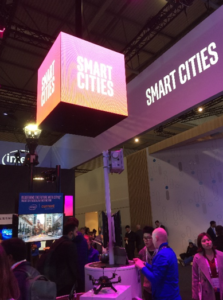
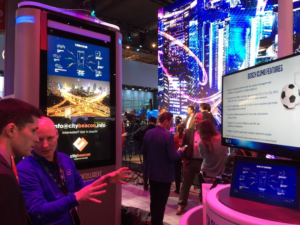
Mobile World is a vendor’s fair. As interesting as it is to see the latest in technology trends and applications, I was there on behalf of ICF, meeting people from around the world interested in the intelligent community movement, speaking at an event associated with Mobile World, with a slightly different twist. (Or at least I was until it was cancelled due to snow!) But technology will still save the day. Earlier in the day, an hour-long video interview was organized with a Spanish journalist interested in better understanding the Intelligent Community movement. The organizers will share the video with all of the registered attendees and there is a plan to follow-up through a Webinar at a later date.
Earlier in Madrid and Valencia, I was able to make presentations to Madrid’s Aspen Institute and to the municipality, regional government and area institutions and startups. In addition to promoting ICF’s member communities as innovative communities in which to connect with, do business with and potentially leverage their unique intelligent community qualities, we were also discussing the impacts of all this new technology, good and bad, as we move toward an IoT world, enhanced by the future of 5G. What is the digital world doing to advance humanity? While the evolution of smart cities will create more efficient and cost-effective cities, how can they also be leveraged to attract and retain investment, innovation and talent, key ingredients for a successful Intelligent Community.
Mobile World allows people to keep up with the technology which is changing almost daily. Understanding how these technologies and applications will impact our quality of life is not easy, but is becoming mandatory for us to do so. Broadband and related technologies have become an essential utility; and in some enlightened parts of the world, a human right. Equitable access to education and to affordable advanced technology, such as high-speed broadband, are economic levelers that in some places are politically motivated, may be limited by geography or at the economic and business decision of service providers in a region. But in some cases, where adventurous champions and entrepreneurs are present, communities have taken it upon themselves to be self-reliant and establish their own innovative networks, smart initiatives and advanced intelligent community programs. Some, such as remote and rural communities will become dependent on this connectivity to be relevant in today’s world. People want to hear these stories; learn the details through evidence-based data; become inspired that they too can achieve this transformation if they only try; and by understanding the best practices and case studies of others that have gone on before them, that they too might be able to have the insights to be able to make the decisions necessary for their communities to be globally competitive and to be able to attract and retain jobs and investment in their communities.
These are the stories that ICF and its ICF Nations, such as ICF Canada, ICF Taiwan, and its Institutes tell every day. It is through these best practices and case studies that many communities become inspired and make decisions to advance their communities. Many are no-name communities and some are even located in what some globally might consider to be in the middle of nowhere. But each of these believed in themselves enough to become the little communities that thought they could become, and eventually did transform, to become better places that their citizens now fully enjoy and can effectively raise their families in and call home. Mobile World Congress in future years will need to deal with these issues as it will become a mecca for learning but also for better understanding the impacts that these technologies and applications will have on the quality of life in our communities. The UN Social Development Guidelines (SDG) being promoted at the show is a good beginning, but far more will need to be done in these areas. ICF is working on these stories and benchmarking communities every day. For a smaple of the work and a deep dive into many Intelligent Communities, join us at the ICF Summit in London between June 4-6 to learn more: https://www.intelligentcommunity.org/summit_18

![]()
![]()
Want to have a voice in iCommunity.ca, the official newsletter of ICF Canada? Please send your blogs, announcements and other interesting content to John G. Jung at [email protected]
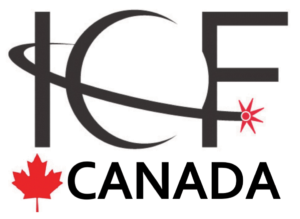
ICF Canada 1310-20 Bay Street Toronto, Ontario M5J 2N8 www.icf-canada.com
Contact: John G. Jung at [email protected] 1-647-801-4238 cell
Want to change how you receive these emails?
You can update your preferences or unsubscribe from this list
